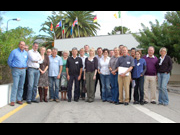Support for EWCs to anticipate and manage change: an ICTS project

A seminar for European Works Council (EWC) coordinators in the ICT industry was held in Sesimbra, Portugal. UNI europa ICTS had organised the seminar in cooperation with ver.di-innotec, a subsidiary of UNI’s German affiliate ver.di.
UNI europa affiliates from 7 countries had nominated some 16 candidates for the seminar, whose future role will be to help EWCs in the ICT industry to improve their proceedings and become more effective.
The role of EWC coordinators is to act as interface between UNI europa ICTS and selected EWCs in the ICT industry. The intention is to establish a network of competent and committed coordinators, who are qualified to assist Special Negotiation Bodies (SNB) in their endeavours to set up EWCs. Coordinators also advise and coach EWCs, their members and ad hoc working groups in order to make them more efficient.
The training course, which ran over four days included learning modules on European industrial relations, relevant EWC legislation and case law, development of soft-skills such as bargaining, inter-cultural differences, conflict mediation and also practical exercises in small working groups. The exercises were based on real cases and covered issues such as relocation, denial of information and consultation, conflicts with management and among EWC members, working methods, etc. There was a strong emphasis on developing skills to anticipate and manage change in the industry.
Participants also discussed the development of a web based “one-stop-shop” toolbox, which makes relevant information swiftly available to coordinators.
The Sesimbra seminar was the first in a series, which equipped the future coordinators with basic and relevant skills. It is intended to train coordinators from affiliates in 10 European countries. In follow up seminars, planned for early 2010, the coordinators will meet with key members of EWC, which they are expected to serve in the future, in order to develop a basis for common work and activities in the future.
The project is largely financed by the EU Commission and will run until mid 2010. Further seminars will follow in January, in Nice, France and early May in Sesimbra again.
For further information you may contact UNI europa ICTS: Gerhard Rohde

